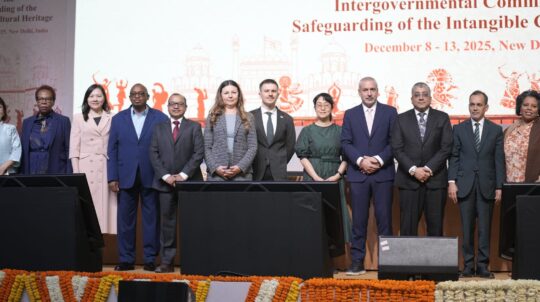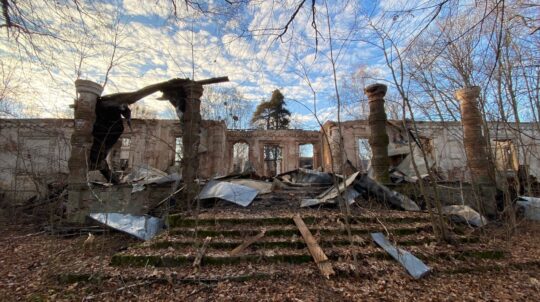The Expert Council of the Ministry of Culture and Information Policy of Ukraine on Overcoming the Consequences of Russification and Totalitarianism has prepared general recommendations for local self-government bodies and public organizations with the aim of providing assistance in overcoming the anti-Ukrainian influence of russian civilizational myths, russian imperial and Soviet totalitarian heritage in the public space of populated areas of Ukraine.
.jpeg)
During the discussion, all members of the Council agreed that the process of overcoming the consequences of the russian imperial and Soviet totalitarian policies should be balanced, based on public dialogue, open professional discussion, but at the same time, it can not be postponed in time, because this is an important component of mental resistance to aggression.

Issues regarding preservation in public space or replacement (in the case of toponyms), or dismantling and relocation (in the case of monuments) must be resolved in accordance with the current legislation on local self-government, as well as legislation in the field of cultural heritage protection.
At the same time, the approaches to decision-making regarding objects, names, and symbols of the russian imperial and Soviet totalitarian past should not be formal, but should be determined on a scientific basis and in the presence of public dialogue. It is advisable to avoid generalized group criteria, instead, it is worth approaching each case individually.

At the same time, it should be taken into account that the russian imperial and Soviet totalitarian practices mythologized certain figures and events. An indicator of their instrumentalization is the mass planting of names, objects, symbols in public spaces of Ukrainian settlements.

Taking into account the stated facts, when making decisions regarding the removal from public space or preservation of objects, names, symbols of the russian imperial and Soviet totalitarian policies, it is advisable to take into account the following criteria:
- the extent and consequences of the participation of a political or cultural figure in the implementation of the russian imperial and Soviet totalitarian policies;
- how certain objects, names, figures, or works promote imperial and totalitarian narratives;
- the individual’s contribution to the development of Ukrainian and world culture, science and other socially significant spheres of human activity;
- personal outlook position, value orientations of one or another figure;
- a person’s attitude towards the Ukrainian identity and the identity of the indigenous people of Ukraine;
- mythologizing and instrumentalization of a figure or historical event by imperial and totalitarian propaganda.

In particular, inadvisable is the existence in public space of names, objects, symbols related to:
- the implementation of the russian imperial and totalitarian policy aimed at the subjugation of Ukraine, the persecution of the participants of the struggle for independence, the implementation of political repressions and other crimes of the imperial and totalitarian regimes;
- the names of russian cities and other geographical, historical and cultural objects of the russian federation that are not directly related to Ukrainian history;
- persons who took an active part in the implementation and/or propaganda of the russian imperial and Soviet totalitarian policy;
- persons who took a direct part in the persecution of the participants of the struggle for independence, the implementation of political repressions and other crimes of the imperial and totalitarian regimes;
- persons and events that were mythologized by imperial and totalitarian propaganda and are still used by russian propaganda to spread their own narratives.

It should also be emphasized that the disappearance from the public space of toponyms or monuments in honor of certain cultural figures does not equal the disappearance of their cultural work, which remains accessible.
At the same time, in the process of cleaning the public space from the russian imperial and Soviet totalitarian heritage, it is important not to allow the destruction of the memory of historical figures and events that are truly significant for Ukraine and a specific city or village.
It is appropriate to preserve names/objects associated with persons who:
- made an important contribution to the development of Ukrainian or world science, culture and other spheres of social life;
- were sympathetic (tolerant) to Ukraine and Ukrainian culture, recognized its equality with other cultures;
- fought against totalitarian regimes or were persecuted by them.

It is important to preserve the memory of heroes and heroines, defenders of Ukraine, including soldiers, officers, doctors and nurses, members of the Resistance Movement and others who defended Ukraine from the Nazi invaders.
It is important to consider that overcoming the consequences of russification should not lead to the narrowing and primitivization of the cultural space in Ukraine, but instead should stimulate the development of an inclusive humanitarian and cultural environment, at the same time filling it with its own unique valuable content.

When making a decision to preserve in public space or dismantle and transfer a work of monumental art to a museum, it is necessary to take into account the level of skill and the author’s contribution to the development of Ukrainian art, the artistic value and originality of the work. Works of art, regarding which there is a public consensus about the impracticality of their further existence in public spaces, should be moved to museum space.
If it is necessary, to propose temporary solutions regarding the removal of site of monumental art from the public space – closing, masking of art objects, in order to avoid hasty decisions and prevent the loss of cultural property.

It is also worth promoting the preservation of works of monumental art, in particular elements of decoration and decor in public space, and introducing methods of their critical rethinking. While preserving the integrity of material objects, giving them a new meaning is a condemnation of imperial and totalitarian policies.

Thus, the general approaches are prudence, objectivity, timeliness and complete response to the request of Ukrainian society to overcome the anti-Ukrainian influence of russian civilizational myths, russian imperial and Soviet totalitarian policies in the public spaces of populated areas of Ukraine as a response to the challenges of the global conflict of democratic and totalitarian civilizations.
It should be reminded that earlier the MCIP, together with the Ukrainian Institute of National Remembrance, prepared key information on the legislative framework of the processes of decommunization and de-russification in Ukraine.

